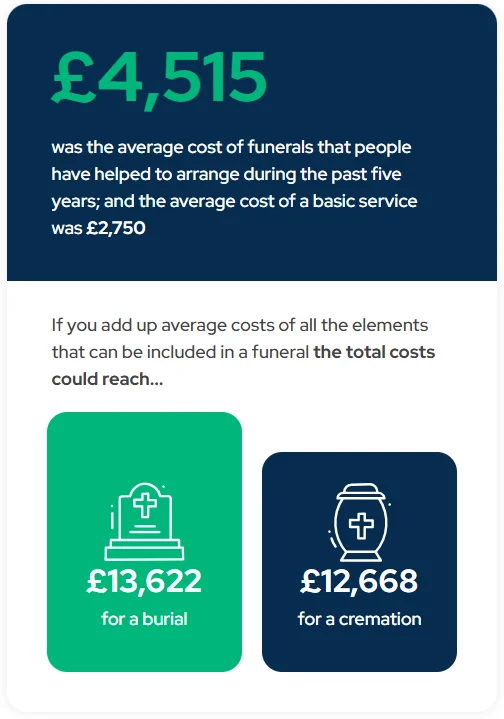It can be difficult to contemplate what happens once you pass away. No matter who you are, it's understandable that it may be a sensitive topic. A good way to approach it is to be as informed as possible. While you might not be able to predict everything that will happen you can have a plan in place.
One of the most obvious things to think about is how your body will be taken care of once you pass away. As it stands, two of the most common options are either opting for a cremation or a burial.
Ultimately, there is no right or wrong option when it comes to what happens next, just what sounds best for you. In this article, we’ll also go through some of the details that are involved with both methods. It’s understandable to be intimidated by the whole process but being informed is the first step in getting some peace of mind.
How does burial work?
If you’re still unsure how to begin planning a funeral our guide to funeral planning may help you out. Once you’ve made contact with the funeral director they take care of a few things when it comes to preparing the body.
When it comes to the actual disposition of the body there are a few key steps that take place. These can be split into surgical and cosmetic procedures.
The following might seem like a lot of detailed information but it’s important to understand it.
Surgical Procedures
In the first stage of the process, the body is given several treatments that slow down the process of decay. Part of this process is embalming. During this, the deceased’s body is treated with formaldehyde-based chemicals. These are introduced into the body by either being injected or surgically placed.
After this, there are a few surgical procedures that take place. These are handled with the utmost care and understanding.
This again highlights why it really is so important to be prepared. If you plan you have the opportunity to select a funeral director that has a fantastic reputation. At British Seniors, we have partnered with Golden Charter. If you choose us as your Life Insurance provider, Golden Charter will contribute £300 towards the cost of your funeral1. They have access to an extensive network of high-quality funeral directors around the UK.
Cosmetic Procedures
The second major aspect of this preparation is cosmetic procedures. As the name might suggest these are largely to do with how the body looks on the outside. At this point, the embalmer will give the body a facial expression using a few different techniques. This can involve either sewing something shut or massaging the muscles in the body.
Once this is complete the family then provide the funeral directors with things like clothes and jewellery. Makeup is also applied to the body in order to offset any signs of decay.
How much does a burial cost?
£4,515 was the average cost of a funeral in the UK over the last 5 years. This might seem expensive, but you may now be able to see why this is the case. Funeral director fees can significantly contribute to these costs.
The preparation of the body requires a lot of skill and to do it right can be a painstaking process. However, when it comes to the disposition of a loved one cost may not come into the conversation.
Cremation: What you should know
Increasingly cremation is becoming a more common choice for people. As attitudes towards religion and tradition change, more people are exploring this as a viable option.
How does Cremation work?
The overall principle of cremation is to burn the remains of a body. It sounds simple but there are a few key steps to the preparation, like burial.
Modern crematoriums have industrial furnaces that can take care of the process in a matter of hours. While there are not as many chemicals involved as a burial there is still some preparation that goes into a cremation.
Once the body is received by the funeral directors and fully identified it is then prepared for the cremation process. This means the removal of any jewellery, medical devices and tooth fillings. In some cases, the crematorium will allow a body to be burned with jewellery. The reason why they may be reluctant is that when melted down, some of these metals can release harmful chemicals.
When the body is ready to be cremated you can choose to witness the cremation. You will need to check ahead of time to make sure there will be enough room in the crematorium for everyone who would like to be present.
From there the body is exposed to a specialized flame for approximately 2-3 hours. Once this has been completed, the ashes are then processed. With cremation, the only thing that remains is the bones. The bones do not burn in the same way as other matter. Therefore, once the cremation is completed the bones are ground into what we would consider ashes.
Once the ashes have been processed, they are presented to the family in an urn. It is then up to the family to decide what to do next. Some like to keep the ashes around as a reminder of a loved one. Others prefer to spread the ashes in a place of significance.
How much does Cremation cost?
While the average cost of a basic service in the UK was £2,750 in 2023, If you add together the average cost of all the elements that can be included in a funeral service, average costs could easily reach £12,668 for a cremation.2
The cheapest possible option is what's known as an unattended cremation. In the case of an unattended cremation, there is no service and no real preparation of the body needed. This is generally taken as an option for a more modest funeral and is becoming more popular. Along with the consideration of the processing of the body, another thing to consider is the cost of an urn or container you might choose.
There are a range of options available to you if you select cremation. So realistically it can be as expensive or as cheap as you would like.

Start the Conversation Today
There is no right or wrong answer when it comes to the disposition of a body. Everyone’s needs and requirements are different. The most important thing to take away is that planning is key.
Having a plan in place can avoid a lot of trouble for your loved ones, especially when it comes to the financial side. That’s why at British Seniors we offer benefits that can help you get things sorted out. Not only will you have some money to leave behind but you can also avail of our Funeral Benefit option and a Will Kit. Each of these things can help you to get on the right road when it comes to what happens next.

